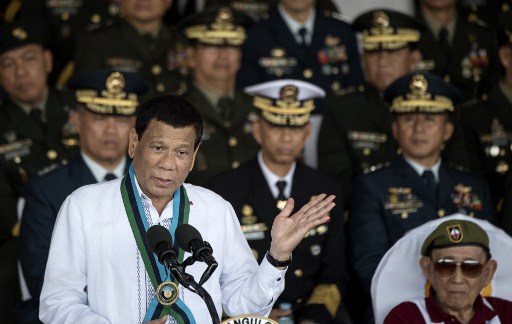
(Eagle News) – Members of the European Parliament urged the Philippine government to “stop extrajudicial killings” on the pretext of war on drugs, claiming that around 12,000 people, including women and children, have been killed in the illegal drugs campaign since July 2016.
The resolution, which was adopted on Thursday, April 19, also called on the Philippine government to reverse its earlier decision to withdraw from the International Criminal Court (ICC) or the Rome Statute, and to remove from the government’s list of terrorists the so-called human rights defenders including Victoria Tauli-Corpuz, the United Nations Special Rapporteur on the rights of indigenous peoples, among more than a dozen demands.
It also called for the European Union and all its Member States to “support a United Nations-led investigation into the killings in the Philippines and for those accountable to be brought to justice.”
The European Parliament’s resolution also expressed concern that President Rodrigo Duterte had “vowed to continue his anti-drug campaign until the end of his presidential term in 2022.”
“The EU remains deeply concerned about the high number of killings associated with the campaign against illegal drugs in the Philippines,” their resolution said.
-European Parliament has wrong figures, info, says new PNP chief –
The newly-installed Philippine National Police chief Director General Oscar Albayalde, meanwhile, wondered where the European Parliament got the 12,000 allegedly killed in the drug war.
“Hindi natin alam kung san nila nakuha yung data nila na more than 12,000, we really do not know if they can give us those details ng sinasabi nilang 12,000 then we’ll be able to check yung data,” Albayalde said.
He said the figure appeared to have been “bloated” and that the European Parliament should give a copy of where they got their information.
”Hindi natin alam yung basis, I think they have to give us a copy of that information,” he said.
The European Parliament resolution approved by “a show of hands” called on the Philippine government to “Philippines to put an immediate end to the extrajudicial killings in the pretext of a “war on drugs”
The resolution also “strongly condemns the high number of extrajudicial killings by the armed forces and vigilante groups related to the anti-drug campaign; expresses its condolences to the families of the victims.”
It also expressed “grave concern over credible reports to the effect that the Philippine police force is falsifying evidence to justify extrajudicial killings, and that it is overwhelmingly the urban poor who are being targeted.”
But the European Parliament also noted the Philippine government’s “recent initiatives to ensure a more unified and integrated approach to anti-drug efforts based on enforcement, justice, advocacy and rehabilitation and integration.”
It welcomed Senate Resolution 516 which was filed by Liberal Party senators that urged the authorities to ‘undertake the necessary steps to stop the spate of killings, especially of our children’
-European Parliament’s other demands-
The European Parliament also calls on the Philippine government to “prioritize the fight against drug trafficking networks and big drug barons over tracking down small-scale consumers” and stressed that the Philippine authorities to “pursue their fight against illicit drugs with a focus on public health and in full compliance with due process, in line with national and international law.”
The European Parliament resolution also invited the Philippines to “cooperate fully with the UN Special Procedures” and called on the Philippine authorities to “immediately carry out impartial and meaningful investigations into these extrajudicial killings and to prosecute and bring all perpetrators to justice.”
The resolution contained 15 actions that it was recommending on the Philippines including the call for the Philippine government to release detained Senator Leila De Lima, and for the Philippines to reverse its decision to withdraw from the Rome Statute among others.
The European Parliament said the Philippine government should “cooperate fully with the Office of the Prosecutor of the International Criminal Court in its preliminary examination of the Philippines.” It said that it “strongly regrets the decision of the Government of the Philippines to initiate its withdrawal from the Rome Statute” and “calls on the Government to reverse this decision.”
It even said that it was “alarmed about the increasing levels of corruption under the current Philippine administration” and seemed to take no account of Philippine government efforts to weed out corruption, including the firing of alleged corrupt government officials by the Philippine president.
The European Parliament also condemned “all threats, harassment, intimidation and violence against those seeking to expose allegations of extra-judicial killings and other human rights abuses in the Philippines, including human rights defenders, journalists and activists; urges the Government of the Philippines to ensure that human rights defenders, journalists and activists can carry out their work in an enabling environment and without fear of reprisals.”
It also “urges the Philippines to stop banning the entry into the country of persons who are perceived as critics of President Duterte’s policies,” while also urging the Philippine government to “observe its obligations under international law to protect the human rights of indigenous peoples, including in the context of armed conflict.”
The European Parliament Resolution adopted on Thursday also “strongly condemned” President Duterte’s “demeaning and misogynist statements about women fighters” as it called on him to “to treat women with respect and to refrain from inciting violence against women.”
It even “encourages the EU and its Member States to consider calling for the Republic of the Philippines to be removed from the United Nations Human Rights Council before its current membership term expires at the end of 2018.”
In an effort to further their demand, the European Parliament’s resolution even threatened to “initiate procedural steps which could lead to the temporary withdrawal of the GSP+ preferences” if the Philippines will not be persuaded to end extrajudicial killings related to the anti-drug campaign. The GSP+ preferences refer to the additional trade incentives to developing countries already benefitting from GSP to implement core international conventions on human and labor rights, sustainable development and good governance.
Finally, it instructed the European Parliament president to forward their resolution to President Duterte and the Philippine government, as well as to the European Council, the European Commission, the parliaments of the EU member states, the United Nations High Commissioner for Human Rights and the governments of the ASEAN Member States.
-DFA’s Cayetano hits European Parliament “interference” –
Philippine Foreign Affairs Secretary criticized the European Parliament for its resolution against the Philippine government, saying it was already considered “interference’ in the affairs of a sovereign state.
“In case the members of the European Parliament are not aware of it, may we remind them that their recommended actions already constitute interference in the affairs of a sovereign state,” Cayetano said.






